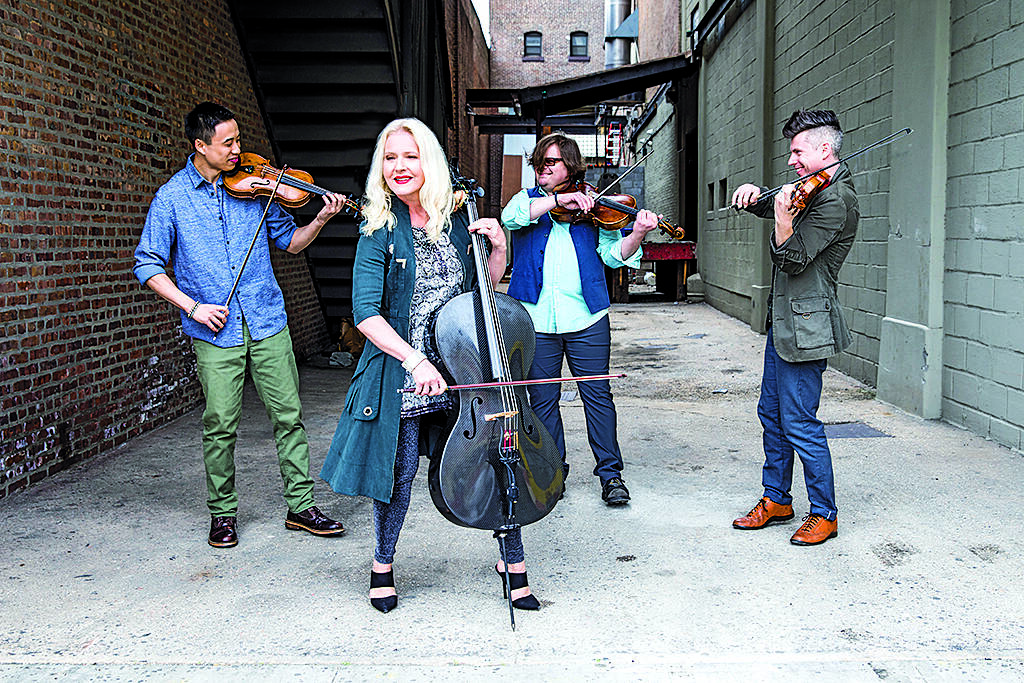A Moving Sound (聲動樂團) has long been one of Taiwan’s most important ambassadors of world music and, in terms of international success, they continue to break new ground.
The five-piece ensemble, which combines world fusion, classical contemporary, traditional Chinese music and modern dance, yesterday released their first album in more than a decade, Wheel of Life on the world’s biggest label for world music, the UK-based ARC Music. The album is a collaboration with Grammy-winning New York City string quartet ETHEL.
The group will next month embark on a five-week tour of the US, including performances at the Smithsonian’s National Museum of Asian Art in Washington DC and Eastman School of Music, a top US conservatory.

Photo courtesy of Ule Ho
Before departing Taiwan, they will also perform in Taipei at Soochow University (東吳大學) on Sept. 3.
“This is the biggest year in our 23-year history,” said group co-founder Scott Prairie.
That is saying a lot. A Moving Sound has seen previous albums make the top 20 of the World Music Chart Europe, gained airplay on BBC Radio 3 and America’s National Public Radio (NPR) and been featured on the Discovery Channel. They’ve performed in twenty countries, including at WOMAD, the world’s most important world music festival, and New York’s Kennedy Center.

Photo courtesy of A Moving Sound
‘CONTACT JAM’
The ensemble was founded by Prairie, an American conservatory musician who studied French horn at Carnegie Mellon School of Music, together with Taiwanese vocalist Mia Hsieh (謝韻雅). The pair, now married, came together in a chance encounter more than 20 years ago in New York City, where Hsieh was then studying on a Fulbright scholarship.
The event was a freeform dance workshop called a “contact jam” at Judson Church in Greenwich Village. Also around that time, Hsieh stumbled into a yodeling competition, and though the concept of yodeling had to be explained to her on the spot, she won the contest and the prize of six weeks of study with Lynn Book. She then later went on to study with Meredith Monk, a pioneer of experimental vocal techniques.

Photo courtesy of A Moving Sound
The training left an indelible imprint on Hsieh. Monk did with the voice what abstract expressionist artists did with paint, her style ranging from yelps and shouts to long, mellifluous, flowing tones. This sonic vocabulary can still be heard in Hsieh’s singing today.
The pair founded A Moving Sound in 2001 after Prairie moved to Taipei, where he said he found a “fertile” Taiwanese arts scene eager for the international, the experimental, and especially, noted Hsieh, “the interdisciplinary.”
On stage, Hsieh is a mesmerizing, fairy-like presence, and dance has always been inseparable from her singing. She fronted the band, and Prairie, seeking an escape from the rigors of chamber music, switched from French horn to bass guitar. They named the group by combining the Chinese characters sheng (聲, sound) and dong (動, movement) and added other musicians on classical Chinese and European instruments and hand percussion. Some of their early performances were hybrid circus shows with hoop dancers, aerialists, jugglers and magicians performing alongside their music.
‘A CERTAIN CLASSICALNESS’
The sound they developed mixed Chinese instruments with what Prairie described as “a certain classicalness.” But the attitude was loose, playful and primal. Even now, they tend to define their music by what it is not –– academic, intellectual, high art or pop.
“Both my parents were laborers,” said Hsieh, who worked as a vendor in a traditional market while growing up. “I wanted to make performances that people –– my parents –– could understand and connect with.”
Between 2004 and 2011, A Moving Sound released four full-length albums with Taiwanese record companies. They then followed the albums with international tours, booked mainly through the group’s own DIY efforts.
A long lull in recording followed until five years ago, when the group’s back catalog was rediscovered by ARC Music, the London-based label that is the world’s largest for world music. The label began re-releasing the early albums one-by-one, then two years ago floated the idea of creating new recordings with string accompaniment.
“I was speechless,” Prairie said, “because it’s something I really, really always wanted to do.”
“They just said, try it, do it,” he added.
But when it came to finding a collaborator, “They had no idea.”
Through a process of “false starts in many different directions,” Prairie finally, through an agent who introduced him to another agent, came into contact with ETHEL, an award-winning string quartet described by The New Yorker as an “avatar of ‘post-classical’ music” –– “virtuosic,” “alternative,” “vital” and “brilliant.”
Prairie and Hsieh kicked off the collaboration by sending existing songs to ETHEL’s musical director Ralph Farris, who then undertook to create “new arrangements and adaptations,” Prairie said.
Farris wove string parts through the songs, adding new timbres, moods and melodic counterpoints to what was already there. In the new recordings, ETHEL’s strings at times take the lead to drive the narrative, while at others hang back to create a mise-en-scene for Hsieh’s vocals.
For recording, the two groups joined together for five days in April 2023 at Kaleidoscope Sound in Union City, New Jersey.
“It’s by far the most beautifully recorded album we’ve ever done,” said Prairie. “Mia’s voice — it’s never really gotten this kind of treatment. It’s just gorgeous.”
The album draws to mind the transcultural fusion of Yo Yo Ma’s (馬友友) Silk Road Ensemble, but perhaps with an added sense of playfulness. Emotions range from the plaintive, heartfelt dirge, Crying Song to the racing, polyrhythmic excitement of A Dynasty Falls.
Hsieh’s voice, as always, exhibits incredible variety, shifting across the nasal scale-sliding of Peking Opera, the lilting melodies of traditional nanguan (南管) music, the earthiness of Taiwan’s aboriginal folk and the storytelling of spoken word. Lyrics are in Taiwanese, Mandarin and English, but mostly she sings in an “imagined language” of long, flowing sounds.
“I want to let my voice fly and play,” Hsieh said. “I’ve always felt that language is limited, but with voice, I can come very close to one hundred percent expressive emotion.”
A Moving Sound’s current lineup consists of five players: vocals, bass, erhu, zhongran (a four-stringed Chinese lute) and Chinese percussion.
This will be their troupe for an autumn tour that centers around Arts Midwest World Fest, a program funded by the US National Endowment for the Arts. A Moving Sound is the first Taiwanese group ever invited to the program.
GRAND TOUR
More a series of residencies than a festival, Arts Midwest World Fest invites world music groups to nine states in the American Midwest for three, three-week tours. Each stop consists of a one-week residency of workshops and community engagement capped by a performance. For the upcoming leg, A Moving Sound will travel to Minot, North Dakota, Hot Springs, South Dakota, and Fairmont, Minnesota from Oct 6 to 26.
Aside from the Smithsonian performance, other stops on the tour include the Eastman School of Music, a top US conservatory, the University of Nevada at Reno, and Iowa State University.
Despite A Moving Sound’s two decades of overseas touring –– “Internationally speaking, we are probably Taiwan’s most successful world music group,” Prairie said, somewhat reluctantly –– the group has only received limited support and recognition from the government.
Recording grants are now common for Taiwanese artists as part of the government’s major push to develop cultural industries. This year, the Ministry of Culture will dole out NT$16.6 million to 15 musical groups and artists to record new albums, none of them as internationally accomplished as A Moving Sound.
“We’ve always been under the radar,” Prairie said. “We never got any album support and we don’t get booked in Taiwan’s National Theater.”
The group has never won a Golden Melody Award, though they have received two nominations, and their most recent application for a recording grant was rejected. They have however received some government touring support. Mainly, they’ve found appreciation overseas and from the audiences who attend their performances.
“In terms of higher level events, for us the opportunities have always been international,” Prairie said.
A Moving Sound’s new album is now available on all major streaming platforms, including Spotify, Apple Music, Amazon Prime and YouTube. For tour information and physical music sales, visit: www.amovingsound.com.

On April 26, The Lancet published a letter from two doctors at Taichung-based China Medical University Hospital (CMUH) warning that “Taiwan’s Health Care System is on the Brink of Collapse.” The authors said that “Years of policy inaction and mismanagement of resources have led to the National Health Insurance system operating under unsustainable conditions.” The pushback was immediate. Errors in the paper were quickly identified and publicized, to discredit the authors (the hospital apologized). CNA reported that CMUH said the letter described Taiwan in 2021 as having 62 nurses per 10,000 people, when the correct number was 78 nurses per 10,000

As we live longer, our risk of cognitive impairment is increasing. How can we delay the onset of symptoms? Do we have to give up every indulgence or can small changes make a difference? We asked neurologists for tips on how to keep our brains healthy for life. TAKE CARE OF YOUR HEALTH “All of the sensible things that apply to bodily health apply to brain health,” says Suzanne O’Sullivan, a consultant in neurology at the National Hospital for Neurology and Neurosurgery in London, and the author of The Age of Diagnosis. “When you’re 20, you can get away with absolute

May 5 to May 11 What started out as friction between Taiwanese students at Taichung First High School and a Japanese head cook escalated dramatically over the first two weeks of May 1927. It began on April 30 when the cook’s wife knew that lotus starch used in that night’s dinner had rat feces in it, but failed to inform staff until the meal was already prepared. The students believed that her silence was intentional, and filed a complaint. The school’s Japanese administrators sided with the cook’s family, dismissing the students as troublemakers and clamping down on their freedoms — with

As Donald Trump’s executive order in March led to the shuttering of Voice of America (VOA) — the global broadcaster whose roots date back to the fight against Nazi propaganda — he quickly attracted support from figures not used to aligning themselves with any US administration. Trump had ordered the US Agency for Global Media, the federal agency that funds VOA and other groups promoting independent journalism overseas, to be “eliminated to the maximum extent consistent with applicable law.” The decision suddenly halted programming in 49 languages to more than 425 million people. In Moscow, Margarita Simonyan, the hardline editor-in-chief of the